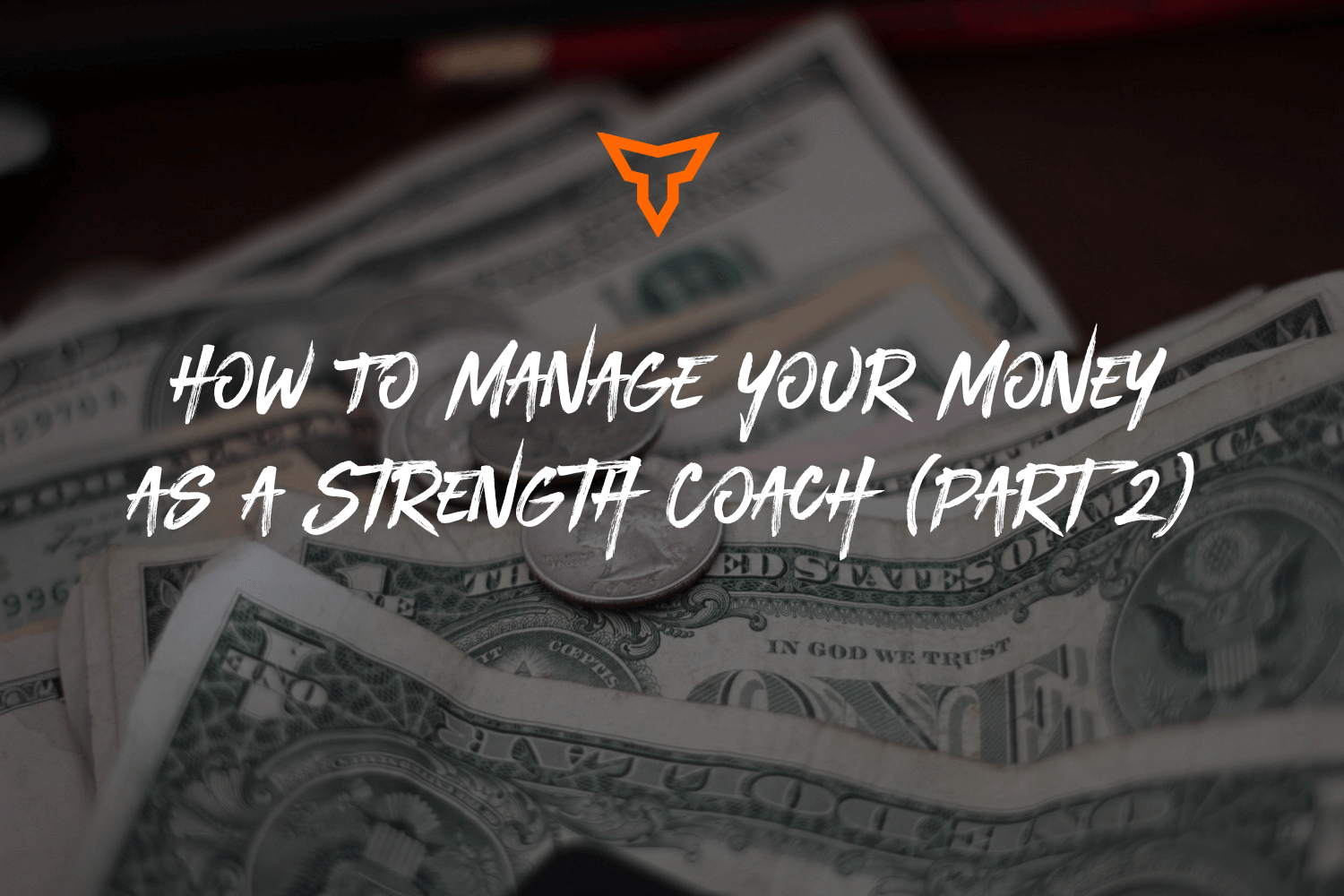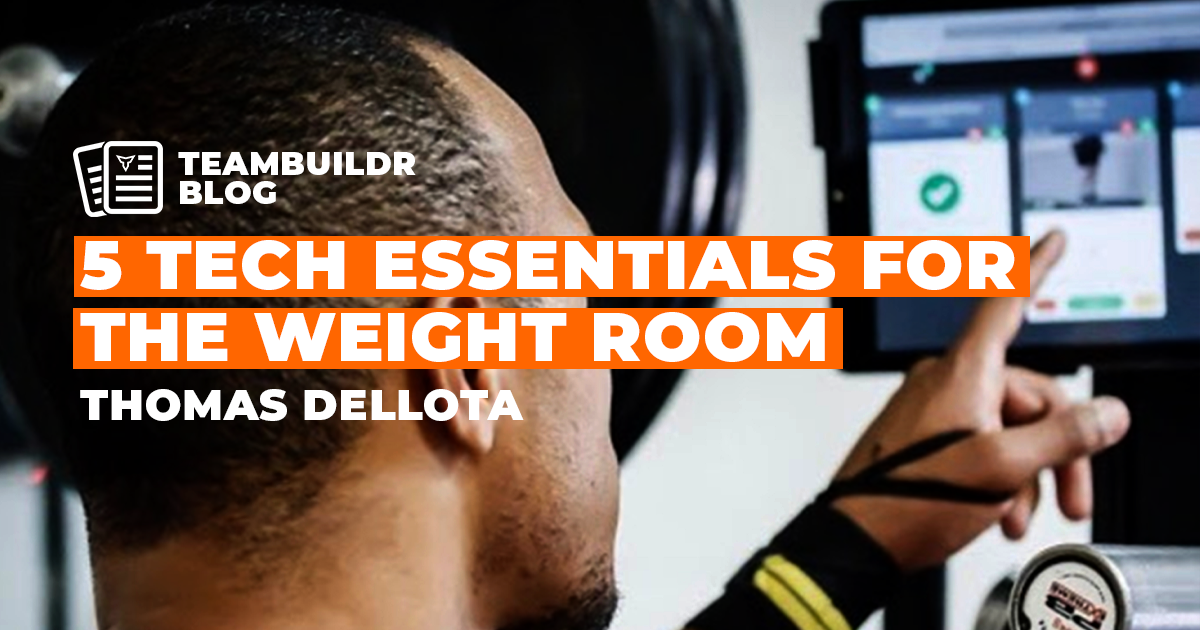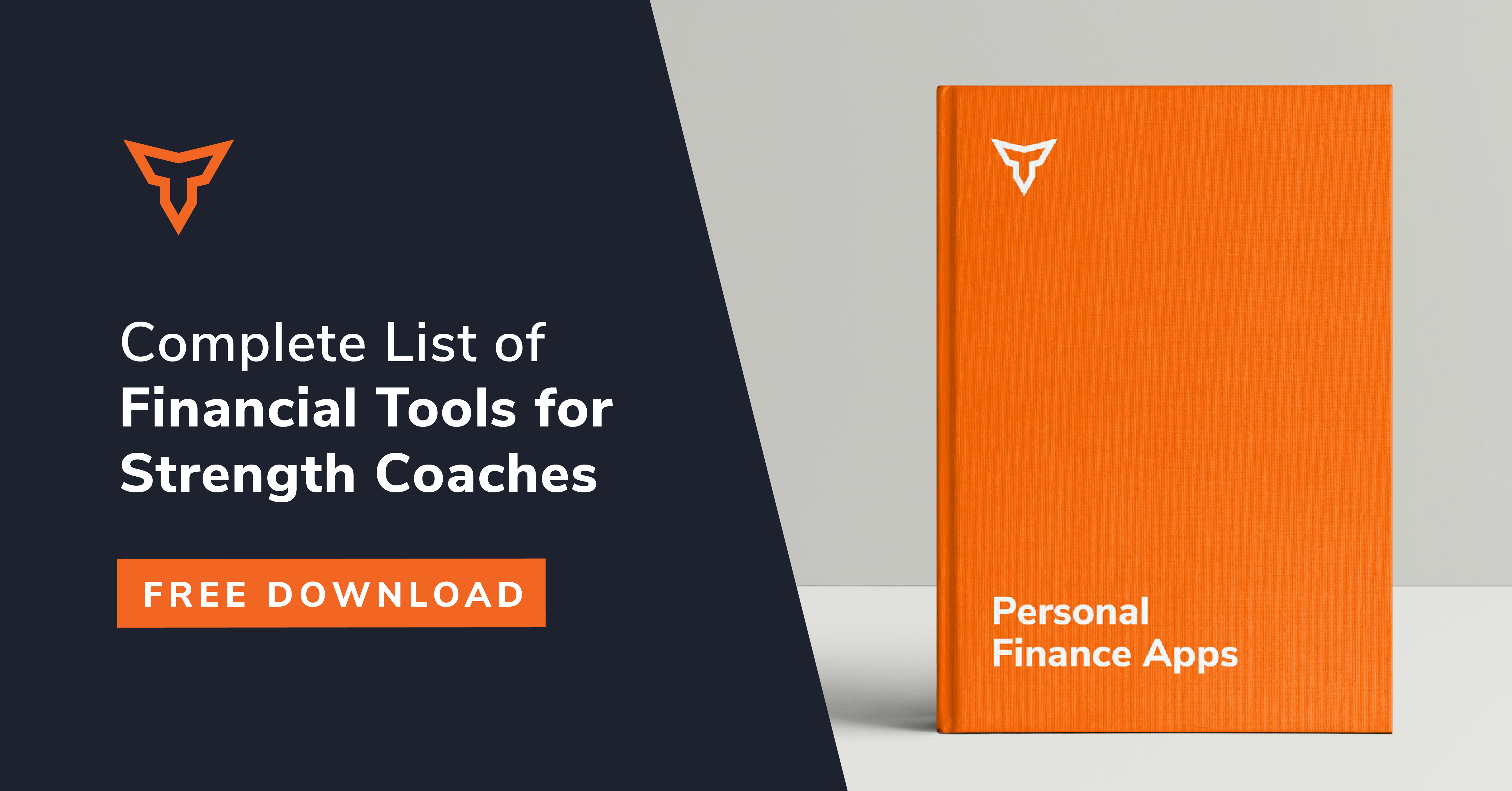How To Manage Your Money as a Strength Coach (Part 1)
How do you describe yourself as a coach? Intelligent? Hard-working? Creative? Gritty? What about good with money? Whoa. Did I lose you at that last one? For some reason, good with money is a term that is rarely used by coaches to self-describe themselves. That’s a complete and total shame too. How many of us take jobs that pay next to nothing, but require us to work well over the standard 40-hour work week? I felt horrible doing it, but I brought a guy on staff for a 10-month renewable position which paid $10,000 a year but no benefits. A position like this isn’t bad for an internship, but the guy joining us already had a master's degree. It’s a complete joke that all we could pay someone that has a master’s degree, a few years of experience, and multiple certifications was $10,000. Ultimately, this is simply the sad truth of having an over-saturation of applicants for every college strength coach position. With situations like this you have to start becoming good with money, but far too many of us aren’t. That's alright, because I'm here to help you with a few money management tips.
First things first. I know you are all coaching for the right reasons. Either you want to give something back, or you are you trying to make a difference in people's lives, or you are trying to leave a program better than the way you found it. I know these things because those are the reasons I do what I do, but you can't pay your rent with good intentions. So like it or not, you have to start being smart about the way you spend your money, which means you need to start planning on what you are going to do with each paycheck. The advice I'm going to share with you is a way for you to eventually not feel like you have to live paycheck-to-paycheck. And by the way I got to tell you I'm a strength coach, not a financial advisor. Whether you follow my money management tips or not, I don't make a dime off of my recommendations and these are just the habits and traits I've personally done and witnessed other people do over the last 17 years. If at some point you seek professional help on how to manage your money, and should, just make sure that person is identified as a fiduciary. Years ago, that was a new word for me too. A fiduciary is someone who is legally obligated your best interests’ front of their own. There's a lot more of legal terms that specifically outline fiduciary responsibilities but it keeps coming back to the idea that a fiduciary prudently takes care of the money or assets of someone else. And just to clarify, all fiduciaries are financial advisors, but not all financial advisors are fiduciaries. Be warned.
Now, let's talk money. Regardless of how much you bring home with each paycheck, this is the combined advice of everyone who has ever talked about becoming wealthy. Ready for it? You need to spend less than what you bring in. Yep, that's it thanks reading the article. Okay, okay there's a lot more to that idea than simply spending less money. It's like telling someone who needs to lose weight just eat less food. It's great advice it's just too vague to be of any real use. So here is what you need to do. You are going to set up 4 different bank accounts. The first one is you main checking account. The second one is call your Emergency Account. The third is your Freedom Account. And the last one is your Good Human Account. While most of your paycheck is going to be deposited in your main account, the other three accounts need to be set up with an automatic transfer that puts 10% into your emergency account. Another 10% goes into your freedom account. The last 10% goes into your good human account. The remaining 70% of your paycheck is for spending on your bills and entertainment. Let's dig into some of the details a little bit deeper.
Any time you are talking about spending or saving money, you have to understand the idea of interest. Which is basically the cost that you pay (or get paid) to use money that you haven’t earned yet. Ultimately, your goal should be not to spend any money on interest, while earning as much interest on as many transaction you can set up. I understand that it isn’t easy, especially when you are trying to buy something like a car, house, or an education. All three of those examples have a very significant price tag associated with them, and in order to afford those purchases you are going to have to borrow money against your future earnings, and most likely you’ll have to pay something extra for the loan, which is called paying interest. In order to lend money to people for those big purchases, banks need to have people like you and I loan them our money so they can loan it out to other people. When this happens, the bank pays interest back to us. Anytime you loan someone money there is a chance that the person will not pay back the loan. In order to make sure investors keep putting their money into the system, banks offer accounts that pay a higher interest rate. If losing money scares you, as it should, then keep your eyes open for lower interest rates offered with savings accounts and certificates of deposits (CD’s). Bankrate.com has their best finds for February 2019 and with as little as $1 to open an account you can get an interest rate of 2.35%. For comparison, just a few years back if you could find a savings account offering 1% interest, then you’d need a minimum starting balance of $1,000 or more.
Why bring up the idea of interest? Your three accounts--emergency, freedom, and good human accounts need to earn you money, which means you need to find something that pays you adequate interest. My strategy with my emergency account is simple, when the time comes that I need a lot of cash for an actual financial emergency like my car died on me, or I have to pay off an emergency room bill, or that I lost my job there would be enough money in my account to at least give me some breathing room until I could get things figured out. This means the account had to be able to transfer money in and out of it at a moment’s notice, but I also wanted my money to work for me and earn interest. This meant I was not going to be putting my money in an account that earns a higher interest rate which means this account was not much more than a glorified savings account. My first goal was to have saved $1,750 which would cover my deductibles for my car, renters, and health insurance policies. Once I hit that goal, then it was to have three months of my salary saved up. Now that I am married, have a child, and own a house my potential emergencies are going to take much more money to fix, so the number I am more comfortable with is having six months of both my wife’s and my salary in our emergency account. This doesn’t happen overnight, but you have to start somewhere.
With my emergency account, I was OK with having a lower interest rate with it. But my freedom account, well that is another thing completely. I call it my freedom account because someday I want the freedom to walk away from what I’m doing and not have to take a job at McDonalds to make ends meet. The goal for this account was to get to $1,000,000 as fast as possible which means that I needed to be OK with taking some risks. Going back to interest rate, remember the higher rates are associated with having a greater risk of losing money. While it might seem counterproductive taking a loss every once in a while isn’t too big of a deal as long as there is enough time from the loss until when you need the money. Just look at the biggest financial disaster of our lives the 2008 crash of the stock market. In about 18 months the market crashed by 50%. If you had family members close to retirement age in 2008, they might still be working since they could have lost about half of everything they saved. All of that makes you wonder if investing in such a risky market like stocks is worth it? Of course it is! Let's say you would have invested $1,000 back in the lowest point in the New York Stock Exchange in 2008. Here is what you would have now:
|
Stock |
Investment (2008) |
Est 2018 Value |
Annual Growth Rate |
|
S&P 500 Index |
$1,000 |
$1923.47 |
6.70% |
|
Apple |
$1,000 |
$7,407.06 |
22.17% |
|
Netflix |
$1,000 |
$74,394.38 |
53.87% |
|
Transocean Ltd. |
$1,000 |
$83.36 |
-22.00% |
|
General Electric |
$1,000 |
$428.76 |
-8.12% |
So is investing in the stock market still a bad idea? Well, it depends on how you look at it. I gave you two examples in how you could have made some serious money and two examples on how you would have lost some serious money. The point is, that everything depends on what and when you are investing. That is why in my freedom fund most of my stock investments are not in specific stocks, but in the index fund of the S&P 500. The S&P 500 acts like the vital signs on how the overall market is doing. Since it is made up of the 500 most valuable traded stocks in the United States, I don’t have to guess which ones are going to boom or bust but instead I just want to see the market increase in its value, which they have since the markets were officially formed in 1817. Sure there is still a risk to any market, but having shares in a index fund lets me be somewhat hands off in my investing but also is giving me a much better interest rate than I would get with a CD or savings account. If you really want your Freedom account to grow, you are going to have to take some risks so you can get the rewards you want.
When you’re a kid, there is so much in life that you are really oblivious to. We go running around, chasing whatever is bright and shining directly in front of our faces and miss everything else. Luckily for me, one of the few things I was focused on as a kid was sports and I was able to see a bunch of people playing in their prime. The Bash Brothers, The Rocket, The Big Unit, Michael Jordan, Bo Jackson, Magic vs. Bird, and the Dream Team. I took it for granted watching all those great and Hall of Fame athletes and I thought there were no former athletes that could hold a candle to the people I was able to watch every day. It wasn’t until I was watching the Opening Ceremony of the 1996 Olympic Games when I was really introduced to one of the people that changed my mind who had the privilege to light the Olympic torch. This was someone who later would help shaped my adult life, The Champ, Muhammad Ali. Sure, I knew a little about his boxing history, but there is so much more than what he did in the ring. The Champ used the spotlight he received as a boxer in order to help people all over the world and helped teach me what it meant to be a good human. Being involved in sports and touching all the lives that we are exposed to there are going to be somethings that break your heart. We hear stories that are so sad, but so inspiring every single day. Sure, our teams have special games for Coaches vs. Cancer, Breast Cancer, the Special Olympics, the Shriners Children's Hospital, and many more than I can list. Whatever the group, one of the things that they need more than awareness is cold hard cash. It’s money that pays for the buildings, the research, and keeps the lights on. There is always going to be some cause that you want to support which is why you need to have a good human account. I’m not saying that you have to give out your money to every single person or cause that asks for it, but in order to be a good human you need to be able to help the people that are right in front of you. At first, you won’t be able to give much money, but let that stop you. Give what you can, and don't underestimate the value of your time either. Go volunteer and meet some of these people that are going through the things that you don’t want to think about. That is going to change your life more than you could ever imagine. Spending your time and money on these charities just reaffirms one of the lessons that the Champ taught me: “Service to others is the rent that you pay for your room here on earth.”
With all of this advice, it doesn’t matter what you are earning a month. $500, $5,000, or $50,000. The number doesn’t matter, it’s what you do with your money does. I firmly believe that the decisions we make control us much more than the conditions we are faced with. Let me say that again: It's not the conditions it your decisions. Decisions on what to believe. Decisions on what to do. Decisions on what to give. Once you decide on becoming good with your money, you get the chance to end your suffering and worrying about living paycheck to paycheck. Now that you are aware of how to start managing your money, you just need to make the decision to get started. Will it be easy? No it won’t, at first. With time and practice it does get easier and easier, until one day the people around you will talk about you and about how good you are with money.
Subscribe to our blog
Subscribe to receive the latest blog posts to your inbox every week.
Related posts

How To Manage Your Money as a Strength Coach (Part 2)

Top 5 Technology Tools for the Weight Room



